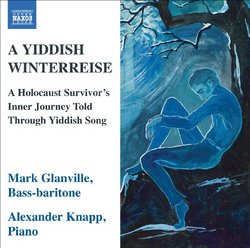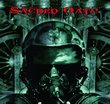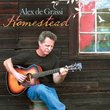| All Artists: Mark Glanville, Alexander Knapp Title: Yiddish Winterreise Members Wishing: 1 Total Copies: 0 Label: Naxos Original Release Date: 1/1/2010 Re-Release Date: 1/26/2010 Genre: Classical Styles: Historical Periods, Classical (c.1770-1830) Number of Discs: 1 SwapaCD Credits: 1 UPC: 747313225675 |
Search - Mark Glanville, Alexander Knapp :: Yiddish Winterreise
CD DetailsSimilar CDs |
CD ReviewsDer rebe hot geheysen freylekh zayn. Giordano Bruno | Wherever I am, I am. | 02/26/2010 (5 out of 5 stars) "Der Rabbi hat uns befohlen, fröhlich zu sein > The Rabbi has told us to be happy. That's the title of the seventh track in this cycle of Yiddish songs assembled as a kind of emotive parallel to Franz Schubert's 'Winterreise' > Winter Journey. And yes, there are some 'happy' moments in this cycle, despite the pervasive sorrow of the Jewish experience in the 19th and 20th Centuries. Most of the poems set to music here are sorrowful to the bone, telling of exile, persecution, exclusion, and postponement of dreams. Like the paintings of Marc Chagall, however, this music has a way of expressing endurance and vitality even in the darkest hours. I'm very sure that Jewish listeners, and 'Goyim' like myself with Jewish connections, will be moved profoundly by both the poems and the music; whether other listeners will be equally touched will depend on their sensitivity. Why the Schubert connection? You'll even find one of Schubert's most memorable songs from Winterreise - Der Lindenbaum - sung in Yiddish translation on this CD. Listening to the 23 songs and their piano accompaniment, you'll certainly hear one explanation; nearly all of the dozen or so composers were obviously influenced by Schubert. But then, virtually every composer of 'Lieder' with piano accompaniment has been influenced by Schubert, who all but invented the genre. Let's be honest: none of these songs match the standard set by Schubert, but some of them are exquisite pieces in their own right. Bass-baritone Mark Glanville explains the connection on his terms in the CD notes. He tells of being inspired, as a child, by hearing the Schubert Lieder sung by the great Dietrich Fischer-Dieskau, which inspired him to pursue a career in music. In fact, he sang Die Winterreise in recitals as a student at Oxford. Since those days, he continues, he has found a love of the Yiddish language and its poetry, and discovered that when he includes such Yiddish songs in his concerts, audiences respond to him singing more emotively. Glanville is an articulate writer as well as a singer. He is not another Fischer-Dieskau vocally -- I don't think he would claim to be -- but he has solid vocal technique and a profound sense of the vocal traditions of Jewish life. I grabbed this CD on the recommendation of the previous reviewer, Robin Friedman, to whom I am grateful." A Yiddish Winterreise Robin Friedman | Washington, D.C. United States | 02/01/2010 (5 out of 5 stars) "In a setting of 24 poems by William Muller, Franz Schubert's greatest song cycle "Die Winterreise" tells a shattering story of rejected love and aimless wandering through the cold and snow of winter. During a cold and snowy winter weekend, I heard this new recording, "A Yiddish Winterreise: A Holocaust Survivor's Inner Journey Told Through Yiddish Song" that includes a song from Schubert and that is loosely modeled on Schubert's masterpiece. The "Yiddish Winterreise" is performed by bass-baritone Mark Glanville, who is both a cantor and a concert singer, and pianist Alexander Knapp, a performer and scholar who specializes in Jewish music. The work consists of a setting of 23 songs in Yiddish. Some are to folk texts and others are composed. The melodies are all those of the songs in their original versions. In many cases, Knapp has elaborated upon the piano accompaniment. The recording was sponsored by the European Association for Jewish Culture and the German Embassy in London.
The tribute to Schubert's incomparable music is apt because it was a deeply sad emotional experience to hear this "Yiddish Winterreise". The theme of this cycle is not romantic rejection. Rather, the music and poems reflect upon the destruction of European Yiddish culture following upon the Holocaust. The narrator is a singer at Jewish weddings who has escaped the doom intended for him. He opens the cycle with a traditional song, unaccompanied, "Singing for the bridegroom" (no. 1) which says: "A bridegroom is king on his wedding day. so say our sages. A groom is like a czar on his wedding day." The cycle concludes (no. 23) with the Jewish prayer of sanctification for the dead: the Kaddish. This is a fitting reflection on the lost culture commemorated in the music. The remaining songs of joy, humor, and sorrow capture a great deal of traditional European Jewish life. Some of these songs, such as "bom, bom, bom, biribirri bom" (no. 3) which is a prayer to God to "remove your anger from us" and "Tumbalalyke" -- play balalika (no. 11) were familiar but most were new to me. At the near mid-point of the cycle, (no 10) there is an express reference to Schubert's "Winterreise" with a Yiddish rendition of its most famous individual song, "Der Lindenbaum". Muller's poem concludes: "Now I am in a foreign land Very far from that place, But still hear the lime tree murmur: 'You would have found rest here!'" Some of the other songs include "Vilne" (no. 4) to a text by A.L. Wolfson which takes a nostalgic look at a pre-Holocaust center of Jewish life and learning. There are five poignant songs setting texts by one Mordechi Gebirtig (1877-1942). His poem "Moyshele my friend" (no. 12) tells of two old friends who meet by chance after many years, with one man plying the other with questions about their childhood days. His poem "Childhood Years" (no 19) likewise takes a sentimental look at youth and innocence: "Childhood years, sweet flowers/You will never come back/To me/Cold, sad/Old gloomy, melancholy years/Have usurped your place". Gebirtig's poem "It's burning" (no. 2) describes the destruction of a village in a Pogrom or, perhaps, in the early stages of the Holocaust. The other two settings of this poet are "Little Orphan" (no. 20) and "An angel is born" (no. 22) Other songs, such as "Under your white stars" (no. 14) express traditional piety while still other such as "Rabbi Elimelekh" (no 17) celebrates a Hasidic rabbi who is not afraid to dance and rejoice. Together with songs such as "Look down from the heavens" (no.16) and "raisins and almonds" (no. 8) which commemorate the destruction wrought upon Jewish communities, there are humorous songs such as "If a Jew has a Wife" (no. 13) and "Khatskele" (no 15) which sing of the vicissitudes of married life. Glanville and Knapp perform with passion. Much of the music is in the minor key while several songs use the Jewish modalities of the synagogue service. The accompaning booklet includes English texts of all the poems. As with the great music for which it was named, it was a wrenching but uplifting experience on a bleak wintry weekend to hear this Yiddish song cycle. Robin Friedman" |



